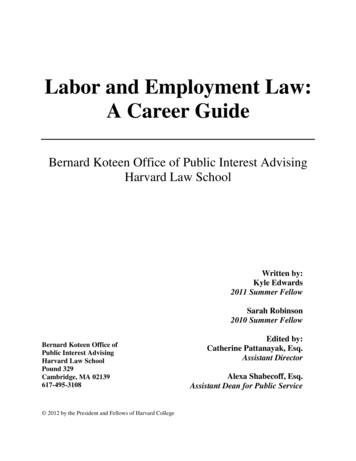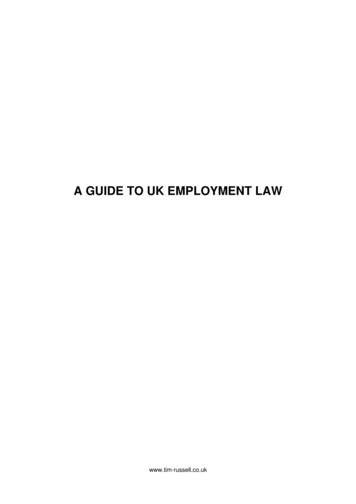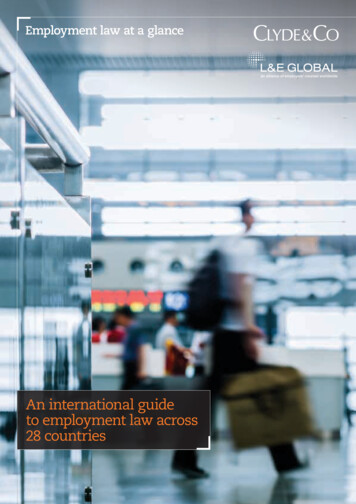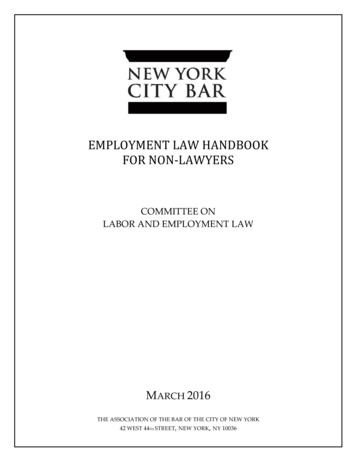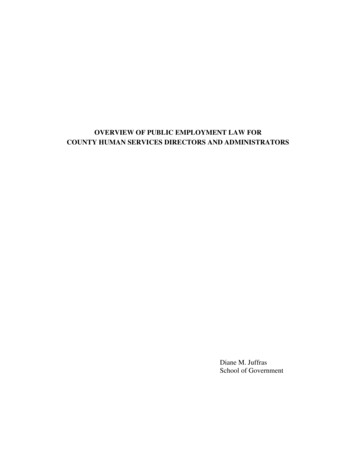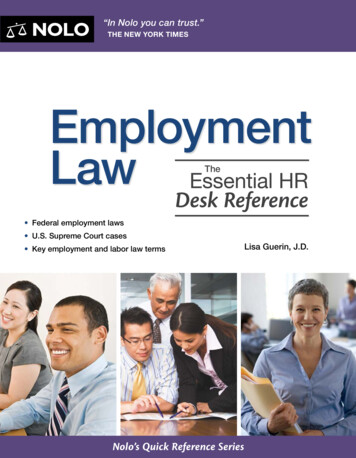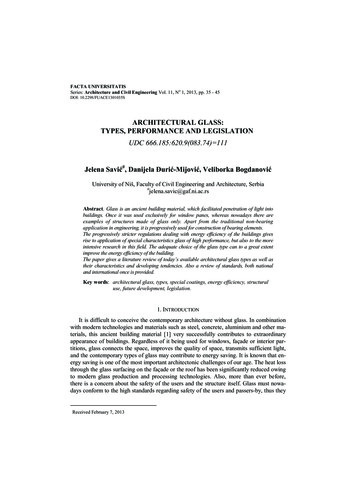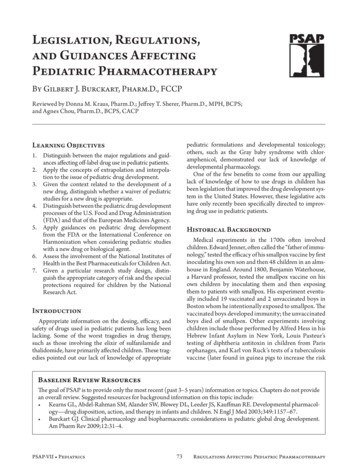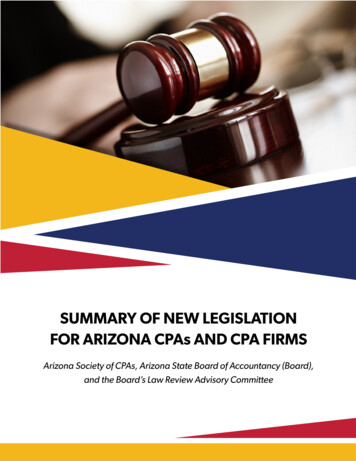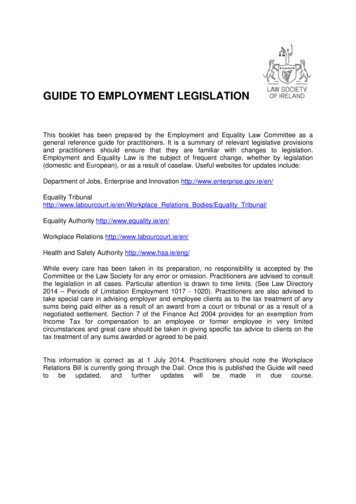
Transcription
ٱ GUIDE TO EMPLOYMENT LEGISLATIONThis booklet has been prepared by the Employment and Equality Law Committee as ageneral reference guide for practitioners. It is a summary of relevant legislative provisionsand practitioners should ensure that they are familiar with changes to legislation.Employment and Equality Law is the subject of frequent change, whether by legislation(domestic and European), or as a result of caselaw. Useful websites for updates include:Department of Jobs, Enterprise and Innovation http://www.enterprise.gov.ie/en/Equality Tribunalhttp://www.labourcourt.ie/en/Workplace Relations Bodies/Equality Tribunal/Equality Authority http://www.equality.ie/en/Workplace Relations http://www.labourcourt.ie/en/Health and Safety Authority http://www.hsa.ie/eng/While every care has been taken in its preparation, no responsibility is accepted by theCommittee or the Law Society for any error or omission. Practitioners are advised to consultthe legislation in all cases. Particular attention is drawn to time limits. (See Law Directory2014 – Periods of Limitation Employment 1017 - 1020). Practitioners are also advised totake special care in advising employer and employee clients as to the tax treatment of anysums being paid either as a result of an award from a court or tribunal or as a result of anegotiated settlement. Section 7 of the Finance Act 2004 provides for an exemption fromIncome Tax for compensation to an employee or former employee in very limitedcircumstances and great care should be taken in giving specific tax advice to clients on thetax treatment of any sums awarded or agreed to be paid.This information is correct as at 1 July 2014. Practitioners should note the WorkplaceRelations Bill is currently going through the Dail. Once this is published the Guide will needto be updated, and further updates will be made in due course.
ٱ ContentsPage1.Terms of Employment .22.Minimum Notice.33.Working Time.44.Wages – Minimum and Payment Requirements.65.Statutory Minimum Wages other than National Minimum Wage.96.Holidays .107.Maternity Leave .128.Adoptive Leave .149.Parental Leave / Force Majeure Leave .1510.Carer’s Leave.1711.Part-time Employees .1812.Agaency Workers .2013.Fixed Term Employees .2114.Health and Safety.2415.Data Protection .2716.Young Persons in Employment.2817.Equality in Employment and in Provision of Goods and Services.3018.Transfer of Undertakings .3319.Dismissal – Termination of Employment .3520.Redundancy – Termination of Employment.3721.Industrial Relations Acts 1946 to 2012 .401
ٱ TERMS OF EMPLOYMENTTerms of Employment (Information) Acts, 1994 - 2012This legislation requires employers to provide a written statement to employees setting outcertain basic terms of employment.The Act applies to any person working under a contract of employment or apprenticeship oremployed through an employment agency or in the service of the State.The statement detailing the required terms and conditions of employment must be given to anew employee within two months of commencing employment.Information to be included in the statement by virtue of the Act: Full name of the employer and the employeeThe address of the employer in the stateThe place of work or a statement indicating that the employee will be required to work atvarious placesJob title and/or nature of the workDate of commencement of employmentIf the contract is temporary the expected durationIf the contract is fixed term the date on which the contract expiresThe rate of remuneration or method of calculating remunerationDetails of how remuneration is paid i.e. weekly, monthly etc., together with confirmationthat an employee may request written details of his/her hourly rate of pay.Terms and conditions relating to hours of work (including overtime)Terms and conditions relating to paid leaveTerms and conditions relating to incapacityTerms and conditions relating to pensions and pension schemes if applicablePeriod of notice which the employee is entitled to receive and required to be given onterminationA reference to any collective agreement which affects the terms of employmentDetails of rest periods and breaksReferences to any Registered Employment Agreements or Employment RegulationOrders which apply to the employee, together with confirmation of where these can beobtained.The statement must be signed and dated by the employee or on his behalf.The employer is obliged to keep this statement for a period of one year after the terminationof the employment. Changes to any terms and conditions required by the Act must benotified to the employee within one month of taking effect.The employer may include additional terms and conditions at its discretion, and dependingon the seniority of the employee, for example: requirements regarding shift workgrievance proceduredisciplinary procedure including company rules and regulationsdeductions from payprovision for lay off/short time2
ٱ additional benefitspost-termination restrictive covenantsIn addition, employers must, within 28 days of the commencement of the employment, givenew staff a written summary of the procedures that would be used should it becomenecessary to dismiss them, pursuant to the Unfair Dismissals Acts 1977-2007.Referral of ComplaintsAn employee may present a complaint to a Rights Commissioner if it appears that hisemployer has failed to provide a full and accurate written statement of the particulars of theterms of employment or has failed to notify the employee of any changes to the particulars inthe statement. A recommendation of a Rights Commissioner can do one of the following: Declare that the complaint was or was not well founded and confirm any of theparticulars contained in a statement of employment or alter the terms of same tocorrect inaccuracies or omissions; Require the employer to give or cause to be given to the employee concerned awritten statement containing such particulars as may be specified by the RightsCommissioner; Order the employer to pay to the employee compensation of such amount (if any) asis just and equitable having regard to all the circumstances but, in any event, notexceeding 4 weeks remuneration.A complaint will be statute-barred if made more than 6 months after termination ofemployment. A party concerned may appeal to the Employment Appeals Tribunal from arecommendation of a Rights Commissioner, and a further appeal lies to the High Court, buton a point of law only. Inspectors appointed by the Minister for Jobs, Enterprise andInnovation are empowered to give employers directions in relation to compliance with theAct.2.MINIMUM NOTICEMinimum Notice and Terms of Employment Acts 1973 to 2005Employees are entitled to statutory minimum notice or pay in lieu except where they havebeen working for an employee for less than 13 weeks or are dismissed for gross misconduct.The statutory entitlements to minimum notice are based on periods of continuous serviceand are as follows:ServiceNotice13 weeks - 2 years2 - 5 years5 - 10 years10 -15 yearsOver 15 years1 week2 weeks4 weeks6 weeks8 weeks.An employee must give an employer at least one week's notice unless the employmentcontract specifies to the contrary.3
ٱ The above notice provisions do not apply, however, where the employer is entitled toterminate the employment contract summarily; that is, immediately without notice, onaccount of the employee’s gross misconduct.Employers and employees may agree longer periods of notice.Procedures and EnforcementRedress for breach of the Minimum Notice and Terms of Employment Acts 1973 to 2005 isobtained by application to the Employment Appeals Tribunal. The Tribunal may awardcompensation to an employee whose employer has not given the employee proper notice orwho has not paid the employee properly during his/her period of notice. In assessing losswith regard to notice, the Tribunal will take into account not only salary/wages but also allother remuneration, such as, commission and overtime. However, if the employee was sickduring the notice period or was on strike, no compensation is payable.The decision of the Employment Appeals Tribunal shall be final and conclusive save that anyperson dissatisfied with the determination of the Tribunal may appeal to the High Court on apoint of law. In addition, the Minister for Jobs, Enterprise and Innovation may, at the requestof the Tribunal, refer a question of law arising in proceedings before it to the High Court fordetermination by it and the determination of the High Court shall be final and conclusive.3.WORKING TIMEOrganisation of Working Time Act 1997 (“the OWTA”)The OWTA regulates working hours for employees (with limited exceptions) as follows:Weekly rest entitlements: An employee shall not work more than a maximum average of 48 working hours in eachperiod of seven days. This average is calculated over a reference period of four months,which may be increased to a period of six months in certain situations. There are alsosome exceptions to this, the most important of which relates to those employees who arein a position to decide their own working hours. The weekly rest period must include a Sunday unless otherwise stated in the contract ofemployment. An employee who is required to work Sundays must be compensated witha reasonable allowance or increase in pay or time off or a combination of these.Daily rest entitlements: Minimum 15 minute break every 4.5 hours or 30 minutes every 6 hours At least 11 consecutive hours rest in 24 hours.Night Workers: An employee who works at least 3 hours between 12 midnight and 7 am at least 50% ofthe year is a Night Worker. A Night Worker must not work in excess of an average ofeight hours in a 24-hour period calculated over a maximum reference period of twomonths.4
ٱ In addition, an employee who is a special category Night Worker is not permitted to workmore than eight hours in any period of 24 hours. A special category Night Worker issomeone whose work has been assessed as involving a special hazard or a heavyphysical or mental strain.ExemptionsCertain sectors of activity are exempted from the rest provisions of the OWTA. Where thereare specific exemptions in the OWTA, in almost all cases an equivalent compensatory restperiod must be given. It is important to verify if a particular activity is subject to a specificregulation made under the OWTA.There are exemptions from the daily and weekly rest provisions for split-shift workers andfrom other provisions for workers where there may be exceptional or unforeseencircumstances or emergencies.Practitioners need to have regard to a number of relevant regulations made under theOWTA which may affect clients in certain sectors.Relevant Statutory Instruments:(1)Organisation of Working Time Act, 1997 (Commencement) Order, 1997 SI No 392 of1997(2)Organisation of Working Time (Determination of Pay for Holidays) Regulations, 1997SI No 475 of 1997(3)Organisation of Working Time (General Exemptions) Regulations, 1998 SI No 21 of1998(4)Organisation of Working Time (Code of Practice on Compensatory Rest and RelatedMatters) (Declaration) Order, 1998 SI No 44 of 1998(5)Organisation of Working Time (Exemption of Civil Protection Services) Regulations,1998 SI No 52 of 1998(6)Organisation of Working Time (Breaks at Work for Shop Employees) Regulations1998 SI No 57 of 1998(7)Organisation of Working Time (Code of Practice on Sunday Working in the RetailTrade and Related Matters) (Declaration) Order, 1998 SI No 444 of 1998(8)Organisation of Working Time (Public Holiday) Regulations, 1999 SI No 10 of 1999(9)Protection of Young Persons (Employment) Act 1996 (Employment in LicensedPremises) Regulations 2001 S.I. 350 of 2001(10)Organisation of Working Time (National Day of Mourning) Regulations 2001 S.I. 419of 2001(11)Organisation of Working Time (Records) (Prescribed Form and Exemptions)Regulations, 2001 S.I. 473 of 2001(12)European Communities (Workers on Board Sea-Going Fishing Vessels) (Organisationof Working Time) Regulations 2003 S.I. 709 of 20035
ٱ (13)European Communities (Merchant Shipping) (Organisation of Working Time)Regulations 2003 SI No 532 of 2003(14)The European Communities (Organisation of Working Time) (Activitie
This booklet has been prepared by the Employment and Equality Law Committee as a general reference guide for practitioners. It is a summary of relevant legislative provisions and practitioners should ensure that they are familiar with changes to legislation. Employment and Equality Law is the subject of frequent change, whether by legislation

